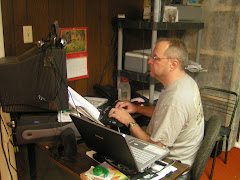Jehovah and Lucifer
A Study in Faith
Christ shows perfect faith from the beginning. By submitting to His father’s will and giving Him the glory, Christ gained infinitely more than He would have otherwise; in fact, He gained all things, infinity in eternity. By letting go and detaching Himself from the process, He was able to bring about the state He promises us in these latter days: “Let thy bowels also be full of charity towards all men, and to the household of faith, and let virtue garnish thy thoughts unceasingly: then shall thy confidence wax strong in the presence of God; and the doctrine of the priesthood shall distil upon thy soul as the dews from heaven.
“The Holy Ghost shall be thy constant companion, and thy scepter an unchanging scepter of righteousness and truth; and thy dominion shall be an everlasting dominion, and without compulsory means it shall flow unto thee forever and ever” (Doctrine & Covenants 121:45-46, emphasis added).
Lucifer shows no faith whatsoever. Instead of patiently, detachedly allowing it to come to him, he attempted to force the issue and compel people to do what he wants them to do. There is nothing everlasting in a dominion based on fear, but given that Satan has no faith, and given that fear is the opposite of faith, his entire kingdom is transitory and ephemeral. In an absolute absence of charity and with no virtue in his thinking, Satan has no confidence whatsoever in the presence of God and no understanding at all of the doctrines. With no claim on the Holy Ghost and the infinite intelligence the Spirit makes available to us, Lucifer must by definition live in fear, darkness and with no real, lasting power. By attempting to grasp power by force, he denies himself the possibility of infinite power, the power enjoyed by the great Jehovah, Jesus Christ, and all those who become joint heirs with Him in His Father’s kingdom.
Thus Lucifer traps himself in a device of his own making. Were he, even now, to submit to the Father, he could find power and faith far beyond what he can only intellectualize, but he cannot, because of his need and desire to compel, and because of his utter lack of faith and love.
As we open ourselves to charity, the pure love of Christ, and to virtue, or excellence and righteousness, we choose a life that brings us greater power without compulsion, and everlasting growth and increase. As we follow in the footsteps of our Savior and Lord, and submit our will to His, we become like Him. At that time, with Him, as promised, we can possess everlasting joy and dominion.


